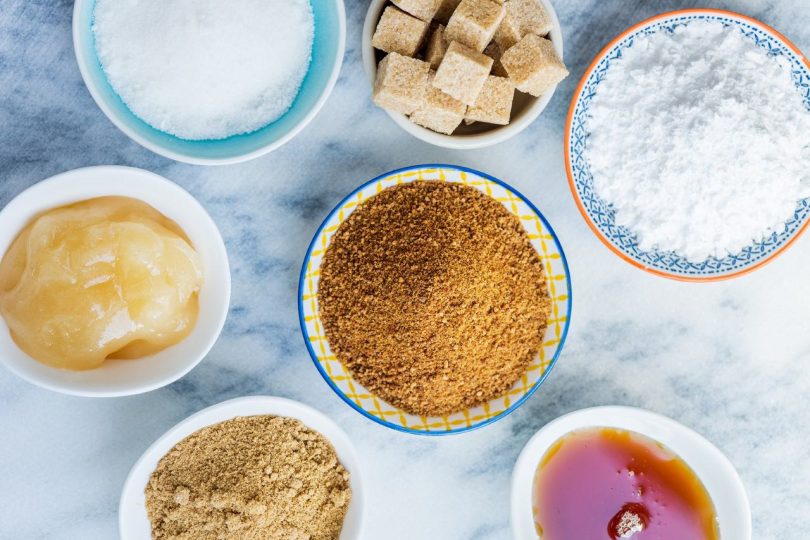If you’re overweight or have diabetes, sugar substitutes can sound like a great way to literally have your cake and eat it too.
“That’s often the assumption,” said Andy Yurechko, a dietitian at Augusta University Health. “But it’s actually not correct.”
Here’s how sugar substitutes work
Created in a lab, artificial sugar substitutes are designed to be hundreds of times sweeter than regular sugar, said Yurechko. “Many of these are in ‘diet’ foods,” he said, “and they all function the same way. Because they’re so much sweeter, you don’t have to use a lot of it to get the desired sweetness. That’s why they’re zero or lower calories compared to regular sugar.”
Some common sugar substitutes are:
Aspartame. This is the most common artificial sweetener used today. You might know it as NutraSweet, Equal, Spoonful or Equal-Measure.
Saccharin. One of the oldest sweeteners on the market, it’s best known as Sweet ‘N Low.
Sucralose. Sucralose is marketed as Splenda and first become popular in the ‘90s.
Stevia. The most natural product, Stevia is extracted from the leaves of the stevia plant.
Sugar alcohols. These aren’t tabletop sweeteners and are found most commonly in processed foods. On labels, look for words like mannitol, sorbitol or xylitol.
So what’s the problem?
Artificial sweeteners, for the most part, are just that: artificial. (Stevia is an exception since it is made from a plant.) “What happens is that the body doesn’t know what these sweeteners are,” said Yurechko.
So when you eat these unnaturally sweet foods, your body expects to be getting more calories. When it actually gets fewer calories, your body signals your brain that you need more food. That can lead to you craving more sweet food and eating more than you should.
“All carbohydrates raise blood sugar levels, and the pancreas releases insulin to ‘balance’ those levels. Sugar substitutes disrupt that delicate balance,” explained Yurechko. “The potency of these sugar substitutes is so great that the pancreas feels the need to secrete more insulin. As a result, our blood sugar levels drop, and we crave carbohydrates to restore the balance.”
Studies have also found that aspartame, in particular, can lead to greater glucose intolerance, a condition where your body has higher than normal glucose levels. In other words, by including foods with aspartame as a regular part of your diet, your insulin may not work as well to lower your blood sugar levels.
Another assumption people make is that these so-called sugar-free foods must be healthier. But another study has found that when you regularly eat foods with sugar substitutes, you are still at high risk for the same diseases related to too much sugar: type 2 diabetes, heart disease, hypertension and stroke. Foods high in sugar substitutes have also been found to lower our “good” gut bacteria, which help keep our digestive tracts healthy. The result can be more stomach upset and diarrhea.
A substitute for sugar substitutes?
The answer, said Yurechko, is to go back to real food. “We never promote foods with lots of sugars and calories, but it’s better to eat stuff with sugar in moderation,” he said.
It’s also a good idea to weigh the kind of sugar you’re eating because not all sugary foods are equivalent. Yurechko likes to compare simple carbohydrates like white bread or pasta, soft drinks, juice and candy, to complex carbohydrates, like whole grain bread or pasta, whole fruit and vegetables, which include fiber that help slow the rise of blood sugar. The simple carbohydrates are like a “straight sugar shot,” he said, so choose complex carbs as much as possible when building your diet.
Read labels, too, to look for added sugars in food. The average recommendation if you’re eating a 2,000 calorie per day diet and are exercising regularly is to eat no more than 50 grams of added sugar per day. To put this in perspective, a single can of soda has about 39 grams of added sugar. So always check labels: You might be surprised to find how much hidden sugar is in the food we eat, everything from canned soups and vegetables to frozen food and breakfast items.
The take home, Yurechko said, is the more natural foods the better. All the rest? Enjoy it in moderation. “This doesn’t mean you can’t ever have pizza or cake, but as a society, we tend to eat those more than we should. But it’s absolutely better to have a little sugar versus eating a lot of food with sugar substitutes.”
Looking for some help managing your diet?
To learn about our weight-loss services, including nutritionists and specialists, call us at 706-446-4887, or visit augustahealth.org/weightloss.





